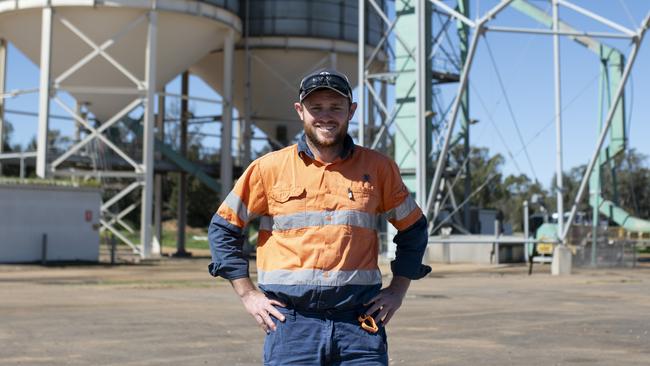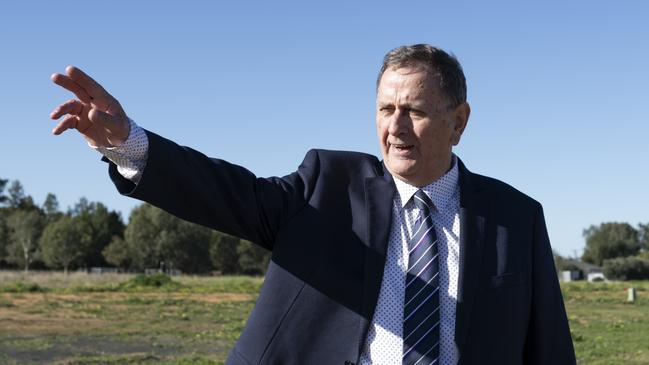Communities concerns over ‘waning’ Inland Rail after decades of waiting
It’s the decades-old plan to build a mega-rail through the heart of outback NSW. But for one tiny town, locals are left wondering when it’ll arrive.
NSW
Don't miss out on the headlines from NSW. Followed categories will be added to My News.
It’s the decades-old plan to build a mega-rail through the heart of outback NSW.
But uncertainty over the future of Inland Rail is holding local towns and businesses from throwing cash and commitments into the project, amid fears chunks of the 1,600 kilometre long track have stalled under Labor.
Some communities have been left waiting for almost two decades for certainty over the project – including at Gilgandra, in central west NSW waiting for the project to catch up to their own commitments.
Gilgandra Mayor Doug Batten said the local council had drilled four bores to help with construction of the freight train track, as well as approving a residential site for construction which would be used to house workers on the rail.
He said the federal government hasn’t “pressed the button to give the confidence to really buy into it”.

“I’d use the word disappointed. The lack of communication (from government), we’ve bought into this in a big way,” he said.
“I don’t think (Infrastructure Minister) Catherine King knows where Gilgandra is.”
Plans for a mega freight railway through the NSW outback are more than 100 years old, with Prime Minister Andrew Fisher in 1915 proposing a route from South Australia to Brisbane through NSW.
Queensland Rail in 1995 detailed a scheme for a Melbourne to Brisbane freight line, while in 2008 Kevin Rudd allocated $15 million to finding a route.
The Coalition first committed to the project in 2017, budgeting $9.3 billion with a completion date of 2026-2027.
A review by the Albanese Government last year found that had blown out to $31.4b with a finish in 2030-2031, with the decision made to prioritise building the rail between Melbourne’s outskirts and Parkes in NSW.
As of 2024, just 17 per cent of the 1600km rail line has been finished.
Josh Connell, head of supply chain at GrainCorp, said uncertainty over the project’s northern section “stifles industry’s ability to co-invest, because they just haven’t got confidence”.
GrainCorp’s Tom Koerstz oversees operations at GrainCorp’s Coonamble and Gilgandra sites, which are among the largest in the company’s network.
“This project is crucial for maximising the benefits of the Inland Rail line and connecting growers in this region with key domestic and export markets,” he said.

Opposition infrastructure spokeswoman Bridget McKenzie claimed the Albanese Government “has effectively derailed work on the project north of Parkes”.
Federal Parkes MP Mark Coulton added there was concerns “momentum is waning” on the project.
He said he had mentioned the project in his first speech to parliament 17 years ago.
A spokeswoman for Minister King said the government was committed to finishing the project.
“We inherited a project where the cost had blown out to around $31 billion, where there was no plan for where it would start and finish, where it would stop along the way, or what it would carry,” she said.
She said, while construction between Victoria and Parkes is due to be completed by 2027, efforts on the northern sections of the track were focused on gaining environmental approvals and securing the land needed for the project.
“Australians deserve better than the mismanagement of public funds committed by the Liberals and Nationals in the delivery of Inland Rail, and that is what we are doing,” she said.
Nick Miller, CEO of Inland Rail, said construction so far had already delivered “major benefits” to communities along the alignment, “with some $460 million spent with over 640 local businesses and nearly 2,700 local workers helping to deliver the project”.
More Coverage
Originally published as Communities concerns over ‘waning’ Inland Rail after decades of waiting





